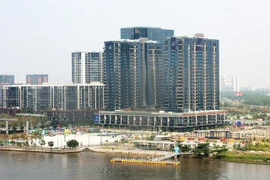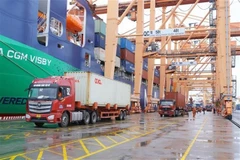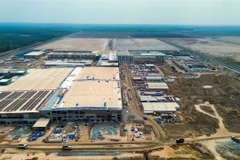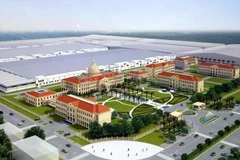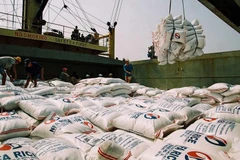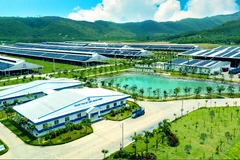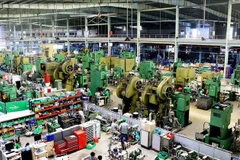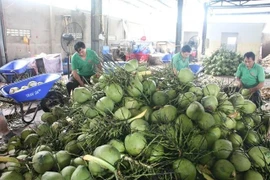Hanoi (VNA) – The economic forecast for 2025 reveals great potential, but also shows challenging investment prospects, especially in the context of fluctuations in global geopolitics and the economy.
It is a pivotal year for many economic development plans, promising to open up attractive investment opportunities but also posing unprecedented challenges. What are the potential areas, risks to pay attention to and optimal strategies for investors?
These are the main contents discussed at the workshop “Investment 2025: Decoding variables - Identifying opportunities,” which was organised by The Economic Investment Newspaper in Hanoi on December 12.
Aspiration for double-digit growth
Despite global fluctuations, Vietnam's economy is estimated to record an impressive growth rate of 7.04% in 2024, demonstrating strong resilience and regaining pre-pandemic growth momentum.
According to Luong Van Khoi, Deputy Director of the Central Institute for Economic Management (CIEM), Vietnam aims to achieve GDP growth of 6.5-7% in 2025 and strives for a growth rate of 7-7.5%. In the long term, the Government is determined to achieve double-digit growth."
“Vietnam is heading for double-digit GDP growth and there is not much doubt about it,” said Khoi.
Pointing out shortcomings, Khoi emphasised that the “locomotive” economic regions - Ho Chi Minh City, Hanoi, Binh Duong, Dong Nai, Ba Ria-Vung Tau - have not contributed a large proportion to growth, and are even gradually reducing their contributions to the country’s GDP. The reason is that these “locomotives” have reached their limits and at the same time, other provinces and smaller cities have risen.
Forecasting the global trend in 2025, Khoi said that the geopolitical situation continues to be uncertain, and is likely to become more complicated. However, the economic environment will improve.
Domestically, growth is derived from controlled inflation, strong agriculture, industry and services, good growth in tourism and exports, and FDI attraction. In addition, strong investment in infrastructure, especially highways and power lines, has facilitated economic connectivity and development. A strong increase in state budget revenue has created the basis for increased public investment spending and development support. The institutional framework has been further improved with the promulgation of new laws such as the Land Law, Housing Law, Real Estate Business Law and Bidding Law.

In particular, Khoi mentioned that the efforts and determination of the Government and localities will continue to be enhanced and expected that 2025 - the "finish line" of the 5-year Socio-Economic Development Plan (2021 - 2025), will be the foundation for building the new 5-year Socio-Economic Development Plan (2026 - 2030).
Khoi pointed out the recovery and good growth from the domestic enterprise sector as another bright spot. At the same time, digital transformation, innovation and application of Industry 4.0 technology in enterprises and the political system will dominate in 2025.
The application of high technology and artificial intelligence (AI) will have a huge impact on all aspects of socioeconomic life. In production and business, AI helps predict market trends and improve customer experiences, increase operational efficiency, and optimise supply chains. The application of AI is predicted to contribute up to 15.7 trillion USD to global GDP by 2030.
New cycle and breakthrough prospects
Regarding investment opportunities, Nguyen Van Dinh, Vice President of the Vietnam Real Estate Association, held that the real estate market will enter a new cycle in 2025.
“Despite many difficulties, with effective management of the Government, along with improved institutional quality, the real estate market is expected to flourish. Accordingly, six important groups of factors affecting the real estate market, including institutions, macroeconomics, planning and infrastructure, finance, market, and information systems, all show positive signals,” Dinh said.
In addition, experts also shared positive views on the expectation of breakthrough growth of the Vietnamese stock market.

Le Duc Khanh, Director of Analysis at VPS Securities Company, said that the market recorded modest growth in 2023 and 2024, at 12-12.7% and 9-10%, respectively. However, the VN-Index is confirming a bottom in the 1,200-1,240-point range and is showing an upward trend. Specifically, the "catalysts" for the market are GDP growth, import-export activities and the "story" of upgrading the market. On that aspect, Khanh expected the VN-Index to grow by 15-20%, or even higher, in 2025.
“Upgrading the stock market and national credit rating is considered a key factor, helping to reduce borrowing costs and attract investment,” Khanh said.
Agreeing with the above view, Le Quang Hung, Senior Director of Investment Analysis at Techcom Capital, said that although the current valuation level on the stock market is quite reasonable for long-term investment, it is still necessary to consider risk management. Therefore, investment assets should not only include stocks but also need to allocate a proportion related to fixed-income assets such as bonds, deposits or sustainable credits.
Noting the challenges of foreign trade and geopolitics, economist Nguyen Tri Hieu emphasised that the return of President Donald Trump with the "America First" policy is expected to bring many challenges to the global economy, especially in terms of trade and exchange rates. Accordingly, he warned about the risk of strong exchange rate fluctuations and export activities that may be affected by US protectionist trade policy and unpredictable developments from geopolitical hotspots.
Hieu cautiously said that 2025 could be a challenging year for the Vietnamese economy.
However, Hoang Xuan Trung from Citi Vietnam Bank had a more optimistic view and assessed that Vietnam still has a lot of room from free trade agreements (FTAs) and will benefit from a strong level of consumer spending, plus a young population and geopolitical advantages.
According to experts, FDI capital flows are forecast to continue to flow strongly into Vietnam next year. Especially in the context of a decrease in foreign direct investment in China, and with Vietnam emerging as an attractive destination in the ASEAN region.
In general, experts believed that 2025 will bring both opportunities and challenges to investors. Therefore, in addition to positive prospects from domestic economic growth, international integration and digital transformation, investors need to be cautious about unpredictable fluctuations in the global economy and US policies. Seizing on key information, analyzing the market and building flexible strategies will be the "key" to success in 2025./.



